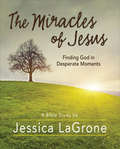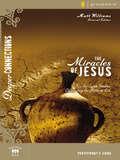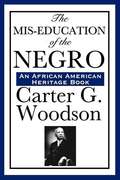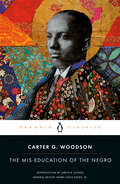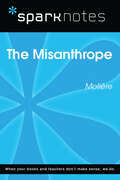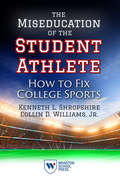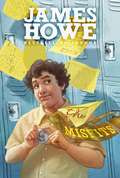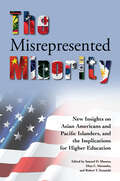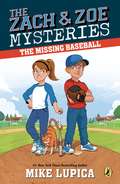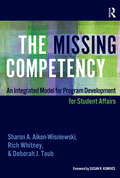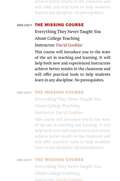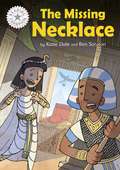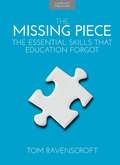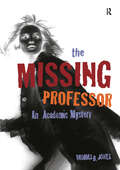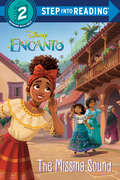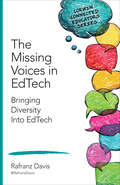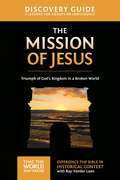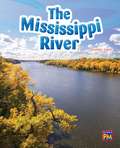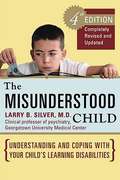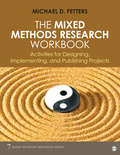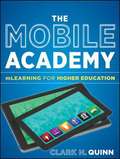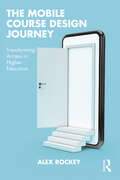- Table View
- List View
The Miracles of Jesus - Women's Bible Study Participant Workbook: Finding God in Desperate Moments (The Miracles of Jesus)
by Jessica LaGroneJesus demonstrated the presence and power of God by performing miracles. He turned water into wine, healed the sick, calmed the storm, opened blind eyes, and raised the dead. While these beloved stories draw our attention to divine power, they also have something else in common: human desperation. Every time we see Jesus performing a miracle, we also get a glimpse into the gift of desperation, a gift that opens us to the dramatic power of God through our desperate need for him. In this six-week Bible study, Jessica LaGrone leads us in a captivating exploration of the miracles of Jesus, helping us to see that our weakness is an invitation for God to work powerfully in our lives and reminding us that we need God on our best days just as much as we do on our worst. Themes and miracle stories include: the gift of desperation (turning water into wine and other signs of God's response of fullness in our times of emptiness) the miracle of abundance (feeding the 5,000 and other abundance stories) miracles on the water (calming the storm, walking on water, the abundant catch) Jesus our healer (5 stories of healing) death and resurrection (Lazarus, Jairus’ daughter) the miracle we all receive (the Incarnation) The participant workbook includes five days of lessons for each week, combining study of Scripture with personal reflection, application, and prayer. Other components for the Bible study, available separately, include a Leader Guide, DVD with six 20-25 minute sessions, and boxed Leader Kit.
The Miracles of Jesus Participant's Guide
by Matt WilliamsHealer of diseases. Master of nature. Conqueror of demons and death. Jesus not only preached the kingdom of God in word, but he demonstrated it in power through his miraculous deeds. In six engaging, interactive small group sessions, this Deep Connection DVD gives you a unique, in-depth look at the miracles of Jesus will open your eyes to their impact on the lives he touched, what they reveal about God’s heart, and their significance for us today. With maps and pictures, outlines, key Scripture verses, discussion questions, plenty of room for note taking, and a personal five-day Bible study for each session, this participant’s guide will help you get the most out of The Miracles of Jesus, both in your group and in applying what you learn to your life.
The Mis-Education of the Negro
by Carter G. WoodsonThe Mis-Education of the Negro is one of the most important books on education ever written. Carter G. Woodson shows us the weakness of Euro-centric based curriculums that fail to include African American history and culture. This system mis-educates the African American student, failing to prepare them for success and to give them an adequate sense of who they are within the system that they must live. Woodson provides many strong solutions to the problems he identifies. A must-read for anyone working in the education field.
The Mis-education of the Negro
by Carter G. WoodsonThe most influential work by &“the father of Black history&”, reflecting the long-standing tradition of antiracist teaching pioneered by Black educatorsA Penguin ClassicThe Mis-education of the Negro (1933) is Woodson&’s most popular classic work of Black social criticism, drawing on history, theory, and memoir. As both student and teacher, Woodson witnessed distortions of Black life in the history and literature taught in schools and universities. He identified a relationship between these distortions in curriculum and the violence circumscribing Black life in the material world, declaring, &“There would be no lynching if it did not start in the schoolroom.&” Woodson&’s primary focus was the impact dominant modes of schooling had on Black youth. This systematic process of mis-education undermined Black people&’s struggles for freedom and justice, and it was an experience that scholars before and after Woodson recognized and worked to challenge.Woodson argued that students, teachers, and leaders needed to be educated in a manner that was accountable to Black experiences and lived realities, both past and present. This edition includes an appendix of selected letters and articles by Woodson, and Suggestions for Further Reading.
The Misanthrope (SparkNotes Literature Guide Series)
by SparkNotesThe Misanthrope (SparkNotes Literature Guide) by Moliere Making the reading experience fun! Created by Harvard students for students everywhere, SparkNotes is a new breed of study guide: smarter, better, faster. Geared to what today's students need to know, SparkNotes provides: *Chapter-by-chapter analysis *Explanations of key themes, motifs, and symbols *A review quiz and essay topicsLively and accessible, these guides are perfect for late-night studying and writing papers
The Miseducation of the Student Athlete: How to Fix College Sports
by Kenneth L. Shropshire Collin D. Williams Jr.The student-athlete’s life: practice, gym, weight room, film review, repeat. Simply put, sports come first. Academics is a distant second. As the revenues generated by big-time college sports continue to skyrocket, virtually all of the debate involves whether (and how much) student-athletes should be paid for play. Kenneth L. Shropshire and Collin D. Williams, Jr., argue that ”student” has to come first in student-athlete: the focus should be on prioritizing a meaningful education.In The Miseducation of the Student Athlete: How to Fix College Sports, Shropshire and Williams draw on new research to reveal that it has become increasingly difficult for college athletes to balance school and sports, much less a social life, leading to serious economic, professional, and emotional consequences for young people. Given that fewer than 2% of all college men’s basketball and football players will play at the professional level, the other 98% of student-athletes must be prepared to find and perform well in jobs outside of their respective field of play.In this bold call to action, Shropshire and Williams explain how we got here and what can be done about it. They lay out The Student-Athlete Manifesto, a roadmap to increase the likelihood that student-athletes can succeed both on and off the field. They also offer a Meaningful Degree Model, which ensures education pays for everyone, along with stories of success that show it is possible to be both a student and an athlete.A critical read for student-athletes, sports leadership, policy makers, and anyone who loves college sports, The Miseducation of the Student Athlete has the potential to disrupt college sport and create lasting change.
The Misfits (The Misfits)
by James HoweKids who get called the worst names oftentimes find each other. That's how it was with us. Skeezie Tookis and Addie Carle and Joe Bunch and me. We call ourselves the Gang of Five, but there are only four of us. We do it to keep people on their toes. Make 'em wonder. Or maybe we do it because we figure that there's one more kid out there who's going to need a gang to be a part of. A misfit, like us.Skeezie, Addie, Joe, and Bobby -- they've been friends forever. They laugh together, have lunch together, and get together once a week at the Candy Kitchen to eat ice cream and talk about important issues. Life isn't always fair, but at least they have each other -- and all they really want to do is survive the seventh grade.That turns out to be more of a challenge than any of them had anticipated. Starting with Addie's refusal to say the Pledge of Allegiance and her insistence on creating a new political party to run for student council, the Gang of Five is in for the ride of their lives. Along the way they will learn about politics and popularity, love and loss, and what it means to be a misfit. After years of getting by, they are given the chance to stand up and be seen -- not as the one-word jokes their classmates have tried to reduce them to, but as the full, complicated human beings they are just beginning to discover they truly are.
The Misrepresented Minority: New Insights on Asian Americans and Pacific Islanders, and the Implications for Higher Education
by Samuel D. Museus Dina C. Maramba Robert T. TeranishiWhile Asian Americans and Pacific Islanders (AAPIs) are growing faster than any other racial group in the U.S., they are all but invisible in higher education, and generally ignored in the research literature, and thus greatly misrepresented and misunderstood.This book presents disaggregated data to unmask important academic achievement and other disparities within the population, and offers new insights that promote more authentic understandings of the realities masked by the designation of AAPI. In offering new perspectives, conceptual frameworks, and empirical research by seasoned and emerging scholars, this book both makes a significant contribution to the emerging knowledge base on AAPIs, and identifies new directions for future scholarship on this population. Its overarching purpose is to provide policymakers, practitioners, and researchers in higher education with the information they need to serve an increasingly important segment of their student populations.In dispelling such misconceptions as that Asian Americans are not really racial minorities, the book opens up the complexity of the racial and ethnic minorities within this group, and identifies the unique challenges that require the attention of anyone in higher education concerned with student access and success, as well as the pipeline to the professoriate.
The Missing Baseball (Zach and Zoe Mysteries, The #1)
by Mike LupicaPerfect for fans of Cam Jansen, #1 New York Times bestseller Mike Lupica begins an exciting new chapter-book series, featuring his trademark sports action and heart, and a lovable twin brother-sister duo who solve sports-related mysteries.There's nothing eight-year-old twins Zach and Zoe Walker love more than playing sports and solving mysteries. And when those two worlds collide . . . well, it doesn't get any better than that. So when a baseball signed by Zach's favorite major league player suddenly goes missing--the search is on! Luckily, amateur sleuths Zach and Zoe are on the case. Can they solve the mystery and find the ball before it's lost for good?In this first book of the Zach and Zoe Mysteries, bestselling author Mike Lupica begins a series for a new and younger audience, introducing readers to a sports-loving detective duo who can swing for the fences and catch the culprit in one fell swoop. With a recipe equal parts sports and mystery, the Zach and Zoe Mysteries break fresh ground for an author who has been called the greatest sportswriter for kids.
The Missing Competency: An Integrated Model for Program Development for Student Affairs
by Deborah J. Taub Sharon A. Aiken-Wisniewski Rich Whitney“Authors Sharon Aiken-Wisniewski, Rich Whitney, and Deborah Taub have done a great service to student affairs and to student learning and development with this fine book, The Missing Competency: A Program Development Model for Student Affairs. The profession owes them great appreciation for returning the foundational competency of programming to our collective attention and providing a contemporary model to implement programs of quality.”—From the foreword by Susan R. KomivesProgram development is central to the work of student affairs professionals, yet the field has not prioritized the development of competency in this area. This theory-to-practice, sequential guide to program development fills that gap in the literature. The authors describe the elements of program planning and delivery from the inception of the idea through the use of assessment to revise and improve the program for the future.Whether a new professional or a seasoned leader, this volume offers the reader a deeper understanding of program development. Starting with a foundational understanding of this process, the book proceeds to a step-by-step process, taking a program from an idea to a proposal with goals, objectives, budget, and timeline with tasks, and beyond planning to implementation. The book concludes with stressing the importance of assessment as the program continues to develop over time. Each chapter applies program development concepts through program examples. Finally, the authors leave readers with tools and templates to support the process.
The Missing Course: Everything They Never Taught You about College Teaching
by David GooblarA generation of research has provided a new understanding of how the brain works and how students learn. David Gooblar offers scholars at all levels a practical guide to the state of the art in teaching and learning. His insights about active learning and the student-centered classroom will be valuable to instructors in any discipline, right away.
The Missing Necklace: Independent Reading White 10 (Reading Champion #201)
by Katie DaleA crime has been committed in Ancient Egypt - who has stolen the Queen's precious necklace? Reading Champion offers independent reading books for children to practise and reinforce their developing reading skills.Fantastic, original stories are accompanied by engaging artwork and a reading activity. Each book has been carefully graded so that it can be matched to a child's reading ability, encouraging reading for pleasure.
The Missing Piece: The Essential Skills That Education Forgot
by Tom RavenscroftThere is a fundamental gap in education. While we focus on building knowledge and securing good grades there is something missing. All of us, whatever we do, need a core set of skills which go beyond the academic - to work with others, to manage ourselves, to communicate effectively, and to creatively solve problems. We might call them different things but we draw on them as much as numeracy or literacy. Tom Ravenscroft knows them as the enterprise skills. If we need them, our students need them even more. They underpin effective learning in the classroom. They stop students dropping out at university. They are more highly valued than academic grades by employers. They are a foundation for successful entrepreneurship. They are the enablers of civic engagement and social mobility. When we look to the next decades, in a world of increased automation, fragmented jobs and the need for constant learning it is these skills that will really set our children and young people up for future success. Yet as an education system, we behave as if they cannot or should not be taught. But they can be, and they must be. Tom Ravenscroft has writen this book almost a decade after he set up Enabling Enterprise as a social enterprise. He was a secondary school teacher and the Enabling Enterprise programme was for the students in his inner-city classroom. They were not learning enough in school, and were in no sense set up for the rest of their lives. Over the last ten years, he has had the enormous privilege of leading a growing team of teachers and has worked with hundreds of classroom teachers, thousands of employer volunteers and over 200,000 students. He has seen these students build those skills with the same rigour and focus as any other academic learning. And he has seen that when they are mastered, we truly allow our students to achieve their potential.
The Missing Piece: The Essential Skills That Education Forgot
by Tom RavenscroftThere is a fundamental gap in education. While we focus on building knowledge and securing good grades there is something missing. All of us, whatever we do, need a core set of skills which go beyond the academic - to work with others, to manage ourselves, to communicate effectively, and to creatively solve problems. We might call them different things but we draw on them as much as numeracy or literacy. Tom Ravenscroft knows them as the enterprise skills. If we need them, our students need them even more. They underpin effective learning in the classroom. They stop students dropping out at university. They are more highly valued than academic grades by employers. They are a foundation for successful entrepreneurship. They are the enablers of civic engagement and social mobility. When we look to the next decades, in a world of increased automation, fragmented jobs and the need for constant learning it is these skills that will really set our children and young people up for future success. Yet as an education system, we behave as if they cannot or should not be taught. But they can be, and they must be. Tom Ravenscroft has writen this book almost a decade after he set up Enabling Enterprise as a social enterprise. He was a secondary school teacher and the Enabling Enterprise programme was for the students in his inner-city classroom. They were not learning enough in school, and were in no sense set up for the rest of their lives. Over the last ten years, he has had the enormous privilege of leading a growing team of teachers and has worked with hundreds of classroom teachers, thousands of employer volunteers and over 200,000 students. He has seen these students build those skills with the same rigour and focus as any other academic learning. And he has seen that when they are mastered, we truly allow our students to achieve their potential.
The Missing Professor: An Academic Mystery / Informal Case Studies / Discussion Stories for Faculty Development, New Faculty Orientation and Campus Conversations
by Thomas B. JonesFresh out of graduate school and desperate to pay off her student loans, Nicole Adams joins the faculty at Higher State U, a small university with a dubious past located in the middle of the Midwest. On her second day of classes as a new assistant professor of philosophy, still flustered and disoriented, Nicole is plunged into a campus-wide mystery. Someone has ransacked the office she shares with the ill-tempered R. Reynolds Raskin, the department's senior professor, and he has since disappeared. Two weeks later, with Raskin still missing, Nicole receives a threatening phone call . . .Read one way, this is an entertaining parody of an academic mystery and a humorous take on academic life. Turning the book upside down reveals another purpose. Each chapter is constructed as an informal case study/discussion story, as is made manifest by a series of discussion questions intended for faculty development, new faculty orientation, and conversations among faculty, administrators, and academic staff. As the mystery unfolds, each chapter finds Nicole encountering challenging situations—such as, the first day of class, student incivility, teaching evaluations, peer observation, academic assessment, the scholarship of teaching and learning, faculty and student rights and responsibilities, core curricula, and tenure standards. This little book can be read and used both ways: as pure entertainment and as a series of informal case studies, spiced with humor, to help break down academic barriers and promote spirited discussions
The Missing Sound (Step into Reading)
by Susana Illera MartínezA Step 2 Step into Reading leveled reader featuring Maribel&’s cousin Dolores from Disney Encanto–now steaming on Disney+! Perfect for children ages 4 to 6!Dolores Madrigal has the amazing ability to hear things that are very far away, from across the whole Encanto she calls home. But one morning when she wakes up, she doesn&’t hear something she usually does. But what? To find out, join Dolores and her magical Madrigal family as they team up to solve a mystery in this sweet and silly story set in the world of Disney Encanto!Step 2 readers use basic vocabulary and short sentences to tell simple stories. For children who recognize familiar words and can sound out new words with help.
The Missing Voices in EdTech: Bringing Diversity Into EdTech (Corwin Connected Educators Series)
by Rafranz DavisMaking tech decisions from a diverse space starts here! This book offers leaders and teachers a reflective journey into diverse perspectives on technology as it is used and understood in our schools. Through step-by-step strategies and powerful vignettes, Rafranz Davis explores the deep impact inclusive EdTech conversations can have for teachers, students, women, and people of color. Educators learn practical, step-by-step solutions to: Engage students and give them a voice Cultivate diverse teacher feedback Encourage EdTech leadership for women and people of color Includes real-life stories from educators. Transform the EdTech landscape and create lasting change with this one-of-a-kind book! The Corwin Connected Educators series is your key to unlocking the greatest resource available to all educators: other educators. Being a Connected Educator is more than a set of actions: it’s a belief in the potential of technology to fuel lifelong learning. "Davis’s book is both a guide for administrators and edtech leaders seeking to better support student and teacher voices and an important testimony to the power of voices willing to raise the tough questions." —Carolyn Foote, Digital Librarian Westlake High School, Austin, Texas "Davis powerfully addresses the human side of technology integration. She moves teachers and school leadership with her passion, while offering real solutions to the issues that arise when integrating technology. Her solutions and ideas focus on improving the discourse between teachers, students, and leadership so that they all work collaboratively in enhancing the learning environment. She also addresses ways we can encourage women and minorities to take leadership roles in the field of education technology." —Shelly Sanchez Terrell Author/Founder of The 30 Goals Challenge for Teachers
The Missing Voices in EdTech: Bringing Diversity Into EdTech (Corwin Connected Educators Series)
by Rafranz DavisMaking tech decisions from a diverse space starts here! This book offers leaders and teachers a reflective journey into diverse perspectives on technology as it is used and understood in our schools. Through step-by-step strategies and powerful vignettes, Rafranz Davis explores the deep impact inclusive EdTech conversations can have for teachers, students, women, and people of color. Educators learn practical, step-by-step solutions to: Engage students and give them a voice Cultivate diverse teacher feedback Encourage EdTech leadership for women and people of color Includes real-life stories from educators. Transform the EdTech landscape and create lasting change with this one-of-a-kind book! The Corwin Connected Educators series is your key to unlocking the greatest resource available to all educators: other educators. Being a Connected Educator is more than a set of actions: it’s a belief in the potential of technology to fuel lifelong learning. "Davis’s book is both a guide for administrators and edtech leaders seeking to better support student and teacher voices and an important testimony to the power of voices willing to raise the tough questions." —Carolyn Foote, Digital Librarian Westlake High School, Austin, Texas "Davis powerfully addresses the human side of technology integration. She moves teachers and school leadership with her passion, while offering real solutions to the issues that arise when integrating technology. Her solutions and ideas focus on improving the discourse between teachers, students, and leadership so that they all work collaboratively in enhancing the learning environment. She also addresses ways we can encourage women and minorities to take leadership roles in the field of education technology." —Shelly Sanchez Terrell Author/Founder of The 30 Goals Challenge for Teachers
The Mission of Jesus Discovery Guide: Triumph of God’s Kingdom in a World in Chaos (That the World May Know)
by Ray Vander Laan Stephen And SorensonIn John 17:26 Jesus says "I made known your name to them, and I will continue to make it known..." In this fourteenth volume of That the World May Know, you'll deepen your understanding of this passionate revelation to a broken world God longs to redeem. Discover how Jesus triumphantly made God's presence known on Earth, and how he asks you to do the same—bringing God's shalom to the chaos of others. Sessions include: Capernaum: Jesus Blinds the Evil One Decapolis: The Other Side—Jesus and the Man Crucifixion: The Coronation of a King Ascension: The King Takes His Throne Pentecost: God Changed His Address Designed for use with The Mission of Jesus Video Study 9780310812586 (sold separately).
The Misunderstood Child, Fourth Edition: Understanding and Coping with Your Child's Learning Disabilities
by Larry B. Silver M.D.The fully revised and updated must-have resource to help you become a supportive and assertive advocate for your childIn print for more than twenty years, The Misunderstood Child has become the go-to reference guide for families of children with learning disorders. This newly revised edition provides the latest research and new and updated content, including:• How to identify and address specific disabilities, from dyslexia to sensory integration disorder• New information on the genetics of learning disorders• Expanded sections on attention-deficit/hyperactivity disorder (ADHD)• The most recent neurological discoveries about how the brain functions in children with learning disabilities• Insights about other neurological disorders common among individuals with learning disabilities, such as anxiety disorders, obsessive-compulsive behaviors, anger-control problems, depression, and tic disorders• Resources, Web sites, and organizations that can aid the treatment process and offer support for both parent and child
The Mixed Methods Research Workbook: Activities for Designing, Implementing, and Publishing Projects (Mixed Methods Research Series #7)
by Michael D. FettersWritten by Michael D. Fetters, one of the leading scholars in the field and co-editor of the Journal of Mixed Methods Research, The Mixed Methods Research Workbook: Activities for Designing, Implementing, and Publishing Projects is the perfect tool for doctoral students and researchers who want support throughout their research project, as well as a practical way to apply the knowledge they’ve learned. With The Mixed Methods Research Workbook, you’ll be ready to tackle your mixed methods research project with confidence. Each chapter follows a familiar framework, starting with learning objectives for each piece of the mixed methods process. Readers have ample space in this text to write notes, fill out activities, and begin their process of actively designing and writing up a mixed methods study. This easy-to follow process gives readers an immediate structure to their projects. Exemplar boxes provide a starting framework, with the text encouraging deeper reflection on mixed methods challenges and opportunities. Stories from the field illuminate struggles and suggestions with the benefit of hindsight. Checklists at the end of each chapter help readers stay organized and key resources provide up-to-date lists of material for further study. From start to finish, readers can follow along with this text as they work on their projects. The text begins by assisting readers in identifying topics and conducting literature reviews in the context of mixed methods, zeroing in to address mixed-methods-specific challenges like integration, leveraging advantages of both qualitative and quantitative methods, and incorporating theory and personal backgrounds. Identifying data sources helps readers organize their data collection. Two chapters on research designs structure the data collection process with procedural diagrams. A unique chapter on mixed methods sampling offers application through basic and advanced designs. The book illustrates integrating and implementing mixed methods designs with practical advice for each of stage of the process. Ethics in a mixed methods context readies readers for the research protocol stage. Several chapters fully explicate the data analysis process, including developing a joint display, a state-of-the-art procedure for analysis and presentation of findings. Closing out the process, the text tackles quality and evaluation in mixed methods studies, preparing your study for publication, and writing up your article.
The Mixed Methods Research Workbook: Activities for Designing, Implementing, and Publishing Projects (Mixed Methods Research Series #7)
by Michael D. FettersWritten by Michael D. Fetters, one of the leading scholars in the field and co-editor of the Journal of Mixed Methods Research, The Mixed Methods Research Workbook: Activities for Designing, Implementing, and Publishing Projects is the perfect tool for doctoral students and researchers who want support throughout their research project, as well as a practical way to apply the knowledge they’ve learned. With The Mixed Methods Research Workbook, you’ll be ready to tackle your mixed methods research project with confidence. Each chapter follows a familiar framework, starting with learning objectives for each piece of the mixed methods process. Readers have ample space in this text to write notes, fill out activities, and begin their process of actively designing and writing up a mixed methods study. This easy-to follow process gives readers an immediate structure to their projects. Exemplar boxes provide a starting framework, with the text encouraging deeper reflection on mixed methods challenges and opportunities. Stories from the field illuminate struggles and suggestions with the benefit of hindsight. Checklists at the end of each chapter help readers stay organized and key resources provide up-to-date lists of material for further study. From start to finish, readers can follow along with this text as they work on their projects. The text begins by assisting readers in identifying topics and conducting literature reviews in the context of mixed methods, zeroing in to address mixed-methods-specific challenges like integration, leveraging advantages of both qualitative and quantitative methods, and incorporating theory and personal backgrounds. Identifying data sources helps readers organize their data collection. Two chapters on research designs structure the data collection process with procedural diagrams. A unique chapter on mixed methods sampling offers application through basic and advanced designs. The book illustrates integrating and implementing mixed methods designs with practical advice for each of stage of the process. Ethics in a mixed methods context readies readers for the research protocol stage. Several chapters fully explicate the data analysis process, including developing a joint display, a state-of-the-art procedure for analysis and presentation of findings. Closing out the process, the text tackles quality and evaluation in mixed methods studies, preparing your study for publication, and writing up your article.
The Mobile Academy
by Clark N. QuinnA fundamental revolution in higher education is being sparked by the ubiquity of mobile devices used by students, faculty, and administrators. The opportunity is ripe for institutions, instructors, and instructional designers to take advantage of mobile technology to enhance the learning experience. To do this, we need to understand the power on tap, examine fundamental principles, review illustrative examples, and ultimately think through ways to improve the learner experience. The Mobile Academy contains theoretical and practical guidance on the ways mobile devices can be used most effectively in higher education. It is a guide for systematically integrating mobile devices into courses and other academic and student support services in order to facilitate learning outcomes and student success. The book covers a wealth of topics, including the use of text messages, mobile web, e-books, and mobile apps, as applied to: Administration: How mobile devices can be used to enhance enrollment, registration, alert messaging, surveys, and more Classroom Content: Suggestions for using mobile devices audio, video, documents, and other content Assessment: Guidance for applying mobile technology to portfolios, quizzes, simulations, and more Communication: Guidance on the various mobile communication options and social networks used for student-teacher interactions and social activities that foster learning The Future: Covers the next wave of mobile learning including virtual field trips, augmented reality, alternate reality games, and more.
The Mobile Course Design Journey: Transforming Access in Higher Education
by Alex RockeyThe Mobile Course Design Journey provides practical strategies to college and university educators and faculty support professionals looking to develop accessible mobile learning experiences. Given the near-ubiquity of mobile device ownership today, creating courses that can be completed entirely on a mobile device is essential to captivating student attention and supporting equity-minded pedagogy. This book frames effective mobile design within a continuum in which educators can make gradual yet meaningful changes to their instruction and course content while leveraging learners’ existing tools and literacies. Original, ready-to-use features such as a rubric for evaluating the mobile-friendliness of course content and assignments as well as a toolkit for leading workshops on mobile design will further help to demystify mobile learning in higher education.
